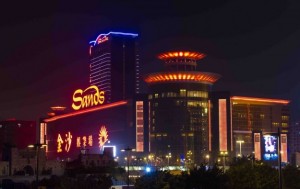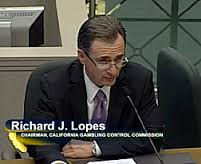That’s Wall Street‘s spin on a 37% decline in May gambling revenues. Writes Carlo Santarelli of Deutsche Bank, “We view the tightening with forecasts … as a modest positive for the group and an indication of  a forming bottom.” In other words, the sub hasn’t stopped sinking but it’s starting to strike silt. One Macanese operator, Sociedade de Jogos de Macau CEO Ambrose So doesn’t see full recovery for two years: “In the long run, with the Hong Kong–Zhuhai–Macao Bridge in use in 2017, business would be back to normal. When the roads are open, money will come in.”
a forming bottom.” In other words, the sub hasn’t stopped sinking but it’s starting to strike silt. One Macanese operator, Sociedade de Jogos de Macau CEO Ambrose So doesn’t see full recovery for two years: “In the long run, with the Hong Kong–Zhuhai–Macao Bridge in use in 2017, business would be back to normal. When the roads are open, money will come in.”
To those like Union Gaming, who deplore the local government’s “environment of increasing unease amongst operators and investors as it interprets Mainland directives and offers knee-jerk reactions to Macau citizen whims,” it is worth remembering that Macao still dwarfs Las Vegas in gambling revenue. Gross gaming revenues for the month were $2.5 billion. Slot numbers weren’t available but Sands China led the market in table games share by a wide margin, with 27%. Sheldon Adelson doesn’t like to hear market share cited as a metric but that number ought to make him a happy camper.
* Santarelli is bullish on Wynn Resorts‘ Boston-area casino (assuming local politicians allow it to be built), writing “we believe the Wynn  Boston project will generate a solid return on invested capital and serve to further geographically diversify the portfolio.” He describes the Massachusetts tax rate (25%) as “manageable,” adding that the megaresort can be expected to generate $700 million to $840 million per year. He does, however, have misgivings about the $1.7 million cost (“the largest spend for a regional gaming facility in U.S. history”) and the long timeframe before Wynn Everett can start paying for itself.
Boston project will generate a solid return on invested capital and serve to further geographically diversify the portfolio.” He describes the Massachusetts tax rate (25%) as “manageable,” adding that the megaresort can be expected to generate $700 million to $840 million per year. He does, however, have misgivings about the $1.7 million cost (“the largest spend for a regional gaming facility in U.S. history”) and the long timeframe before Wynn Everett can start paying for itself.
” Given tight high end hotel supply in the Boston market and superior proximity to the greatest population density in the region, we think investors struggle with the absolute dollar spend,” Santarelli writes, noting that Wynn could probably get the same pop for less money ” which would still enable Wynn Boston to be the most luxurious casino resort destination in the region.” He also worries that the leverage could hamstring Wynn should opportunities in Japan arise or that the money might be better put toward share repurchases. However, the Boston market is just sitting there, waiting to be tapped (just ask Penn National Gaming), so why not Wynn?
* Gambling regulation in the great state of California has become something of a revolving door. Richard Lopes, chairman of the California Bureau of Gaming Control, has resigned, citing health  reasons. However, he presided over the CBGC during a period in which former chief of enforcement Bob Lytle is accused of funneling sensitive information to card rooms, for whom he is now a lobbyist. (Lytle went from enforcer to lobbyist literally in just one day.)
reasons. However, he presided over the CBGC during a period in which former chief of enforcement Bob Lytle is accused of funneling sensitive information to card rooms, for whom he is now a lobbyist. (Lytle went from enforcer to lobbyist literally in just one day.)
Lopes’ resignation comes a fortnight after ex-executive director Tina Littleton accepted a demotion. Lytle apparently used Littleton’s boyfriend as a back-channel to the bureau. Wow. Gaming regulation is nowhere near this colorful in the Silver State (exception when Sam Nazarian is snorting coke and paying off felons.)

